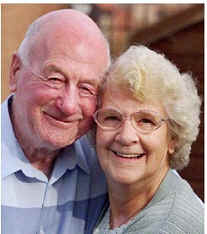
back

|
 |

Cash Poor and House Rich
By Bruce Mohl, The Boston Globe
March 22, 2004
For many seniors, a home is becoming far more than just a place to live.
Increasingly, it's a versatile and surprisingly liquid asset able to spin off large amounts of cash or lines of credit that can help an elderly homeowner cover unexpected expenses, prepare for the future, or buttress his lifestyle.
''Many seniors are beginning to look at their homes differently today," said Bronwyn Belling, project manager for the reverse mortgage program at AARP. ''They are recognizing that the home is more than just shelter. It's a liquid asset that they may be able to tap to their benefit."
The key to unlocking a home's cash potential is the reverse mortgage, so called because the bank makes monthly or lump-sum payments to the homeowner rather than the other way around. The loan comes due when the homeowner dies or moves.
It's a high-cost loan that isn't for everyone. But it is gaining in popularity as seniors grapple with rising expenses for everything from property taxes to prescription drugs while watching their income dwindle from stocks, bonds, and certificates of deposit.
The payments under a reverse mortgage are tax free and don't affect Social Security or Medicare benefits. The size of the payments depends on the value of the home, the age of the loan applicant (the minimum age is 62), and the interest rates being charged.
For a 72-year-old Jamaica Plain resident with a $350,000 home and a $40,000 mortgage loan still outstanding, a reverse mortgage would pay off the existing mortgage and yield a lump sum payment or a credit line of nearly $145,000, or monthly payments of $887 for as long as the resident occupies the home.
The total of federally insured reverse mortgages issued nationally jumped 39 percent in fiscal 2003, to 18,097. During the first four months of the current fiscal year, 8,700 federally insured reverse mortgages were issued, an increase of 76 percent over the same period last year.
Reverse mortgages have particular appeal in the Northeast, where housing values have kept rising even as other parts of the economy have softened. The size of reverse mortgages in this area is capped at just over $290,000, although some lenders offer jumbo reverse mortgages that allow homeowners to tap a greater portion of their equity.
''We are experiencing tremendous growth," said Ken Curley, reverse mortgage specialist for Financial Freedom Senior Funding Corp., a subsidiary of Lehman Brothers. ''To me, it's a problem solver for a lot of seniors."
Reverse mortgages are attractive to seniors who are cash poor but house rich. They may be facing an unexpected cost, like in-home healthcare or a home repair. Or they may want to purchase long-term care insurance or improve their cash flow by paying off their existing mortgage. A reverse mortgage allows them to cover current and possibly future expenses without having to sell their home and move.
''Most people who consider a reverse mortgage consider it because of cash flow issues," said Joe DeMarkey, vice president with BNY Mortgage Co., a subsidiary of Bank of New York.
But many mortgage bankers say the profile of their typical customer is changing. Younger seniors are taking out reverse mortgages, often to enhance their retirement lifestyles.
Cheryl Chapin, national sales manager for the senior products group at Wells Fargo, said two of her clients were a couple who took equity out of their home to buy a new car and go on a cruise.
''They wanted to enjoy their retirement years together. They worked hard and felt they earned it," she said.
Using reverse mortgages as lifestyle enhancers is troubling to Leonard F. Raymond, executive director of Homeowner Options for Massachusetts Elders, or HOME, a nonprofit group that helps low-income seniors hang on to their homes.
He believes the secret to a successful retirement is avoiding debt. A reverse mortgage may make sense for some homeowners, he says, but it should be a last resort. He said homeowners should first explore other ways of covering unexpected costs before tapping the equity in their homes. After all, he said, they may need that equity someday for an emergency.
Ron Rakow, commissioner of assessing for the City of Boston, said many of the city's elderly programs are undersubscribed. He said only six seniors applied for the city's tax deferral program last year.
The program is similar to a reverse mortgage in that it allows an elderly homeowner to defer property taxes, with interest, until he or she dies or moves.
Rakow said 2,500 Boston seniors took advantage of city property tax exemptions last year, but he said more were eligible.
Reverse mortgages are expensive, and unsuitable for someone who doesn't intend to remain in the house for a long time. Between lender fees and mortgage insurance, it's not uncommon for closing costs to range between $10,000 and $13,000.
Because of the high stakes involved, any senior considering a reverse mortgage is required to attend a counseling session to make sure all aspects of the loan are understood and to explore alternatives. Four groups are approved as reverse mortgage counselors in Massachusetts. Their standards vary.
The Consumer Credit Counseling Service of Southern New England does counseling in person, over the phone, or via the Internet. It doesn't charge homeowners for counseling, but solicits donations from lenders to cover its costs.
HOME, by contrast, insists on counseling seniors in person and requires them to have their own attorney at a reverse mortgage closing. Raymond said HOME does not charge for its counseling sessions and does not solicit lenders for money.
One of the biggest problems with reverse mortgages, Raymond said, is that lenders sell seniors on the loans and then send them off for the required counseling.
''To us, the process should start with the counseling," he said.
Copyright © 2004
Global Action on Aging
Terms of
Use | Privacy
Policy | Contact Us
|



